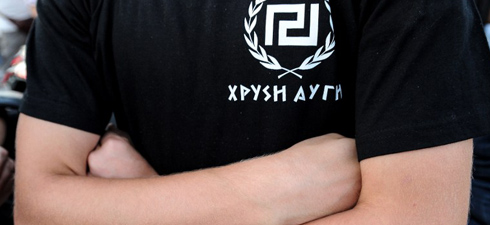The recent emergence of the highly organised and dangerous activity of a far right which is clearly neo-Nazi is a new element in the public sphere, which is typically viewed as a development that has resulted from the grave economic crisis — and there is considerable evidence to justify this argument.
However, close examination of this far right, of its violent actions and the wider context of a passive society that appears to be delighted by violent behaviour, should lead us to pose more profound questions about the causes of a phenomenon, which exists on a scale that is unknown in other European countries, where the larger far-right parties are eager to deny their fascist heritage — and as such can be clearly distinguished from Golden Dawn.
First and foremost, the eruption of neo-Nazi violence is an intrinsic aspect of this phenomenon. The “dynamic approach” that Golden Dawn deploys against “its enemies” is neither conjunctural nor optional, but an essential aspect of the genetic makeup of this party. For this reason, any supposition that the members of Golden Dawn can be progressively included in a democratic political system should be dismissed as naive.
On the contrary, we can expect Golden Dawn to develop through the “legitimation”, exploitation and dissemination of the violent actions that have emerged everywhere in recent years.
Political awareness
This culture of violence is the product of a particular set of circumstances: on the one hand, since it was restored 38 years ago, positive perceptions of democracy have been undermined by the crisis of political representation, the non-respect of social order and the state’s loss of legitimacy; on the other, we have the prevailing rhetoric about the “challenges” posed by the international environment and external threats (for example: immigration).
Under prosperous conditions, this model benefits from a certain prestige that enables it to control the political will of its subjects, but today, in a period of social decline, this is no longer the case.
It follows that a simple basic theory is not sufficient to apprehend or establish a general perception of neo-Nazi violence. Nor are the ritual demonstrations that are organised to express opposition to it. Regardless of their utility, such approaches are simply not adequate to address the factors that develop and generate this violence.
An effective approach to neo-Nazi ideology will require a political awareness on the part of the state, the political class and public institutions, which have been devalued to the point where they are barely capable of responding to social and political problems.
First and foremost, the law must be applied and must not be seen to be circumvented. In recognition of its political power, the state must have the means to democratically regulate and control migration flows. In practice, this will imply a complete overhaul of existing measures and the application of genuine migration policy. Such an initiative would have the dual advantage of exposing the real face of neo-Nazism while also strengthening the institutions that are required to fight it.
Having said that, such a policy would quickly reach its limits if it is not accompanied by an ideological drive to combat the challenge of neo-Nazism. The struggle to oppose the far right is rendered extremely difficult by the fact that it espouses basic tenets of an increasingly prevalent anti-liberal and anti-Western political culture.
Cultural insecurity
In substance it tells us that we are a nation that is under threat on all sides, that our duty is to resist “the new order”, that globalisation is a trick to engineer the international dominance of “Zionism”, that the elite has betrayed us etc.
In a context of economic crisis and declining social mobility, marked by hatred of foreigners and conspiracy theories, an upsurge in anti-capitalist and anti-plutocratic sentiment is accompanied by selfish criticism from the petite petite bourgeoisie that often takes the form of generalised resistance.
The causes of this phenomenon are also present in other European countries. Ongoing research on this subject has adopted the following working hypothesis: extreme social and political attitudes, and in particular anti-system votes for the far right, are not simply the expression of a context of financial crisis, but of a confluence of factors that also includes such cultural variables as the fear of immigration, the transformation of lifestyles and the disappearance of national borders.
All of these factors contribute to sentiment of “cultural insecurity” in social subjects who are experiencing the tangible effects of the crisis or feel threatened by it. In response to this situation, these social subjects devote themselves to the aggrandisement of their own identity, and this is exactly what we are seeing in the ongoing identity crisis in Greece.
Was this article useful? If so we are delighted!
It is freely available because we believe that the right to free and independent information is essential for democracy. But this right is not guaranteed forever, and independence comes at a cost. We need your support in order to continue publishing independent, multilingual news for all Europeans.
Discover our subscription offers and their exclusive benefits and become a member of our community now!












